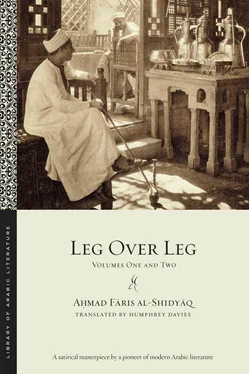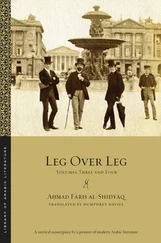2.10.3
“‘If the disease hadn’t already got to you,’ he replied, ‘you wouldn’t be talking this way. We must bring him now,’ and he kept on at me until, shame-faced and embarrassed, I sent my servant to him. Then it occurred to me that, among us, a host, from an excessive sense of hospitality, may force a guest to eat and even sometimes feed him with his own hand something the other cannot stomach but that I’d never heard of anyone doing the honors by forcing another to take medical treatment, so I couldn’t stop myself from laughing. ‘What’s making you laugh?’ he asked. ‘Nothing,’ I responded. ‘No one laughs at nothing,’ he said. ‘There must be something going on.’ I said, ‘I thought of the doctor who visited a sick man and said to his family, “God recompense you for your loss!” “He isn’t dead yet,” they replied. “He will be soon, God willing,” said the doctor, so I laughed.’ ‘Don’t worry about it,’ said the emir. ‘This doctor isn’t like that one, and anyway you’re a bachelor and don’t have any family he could say that to.’
2.10.4
“Presently, the servant came back with the doctor, who was sicker and thinner than me, for it seems he had no work that would take him out of the house. When he entered, he felt my pulse and looked at my tongue. Then he furrowed his brows and looked down at the ground, soliloquizing (which means ‘talking to himself’). Next he raised his head and told my servant, ‘Bring the basin.’ ‘What do you want to do?’ I asked. ‘It’s my body. Shouldn’t you consult me?’ ‘Either I bleed you or it’s the tomb,’ he said. ‘God guide you aright, old man!’ I said. ‘All I did was eat bulgur with meat — what people call kubaybah .’ ‘I know that,’ he said, ‘I know. You Levantines — you all die of eating that kubbah stuff. 493I must have buried a hundred cases when I was in your country. It’s definitely the kubbah .’ ‘A kubbah up your patootie, God willing!’ I said. ‘There’s no kubbah whatsoever in my patties!’ he replied. 494I turned to the emir and laughed, but, as far as I could tell, he didn’t get it either.
2.10.5
“To keep it brief, he and the emir kept on finding fault with my opinion until I surrendered myself to destruction and put out my hand, and he worked away at it with his scalpel like someone cutting a watermelon with a knife and out came the blood, spurting everywhere, some of it even getting into his eyes, which made him let go of my hand and go off to wash his face. When he returned after a short while, I had fainted, so my servant ministered to me with orange-blossom water and other things, while the emir gazed at the smoke made by his tobacco and the doctor whispered in his ear. When I revived, he bandaged my hand and left with the emir, the two of them telling me to look after myself and that they’d come and visit me soon, while I said, under my breath, ‘May God never bring you back!’
2.10.6
“Next day, the doctor returned with an armful of medicinal plants. ‘What are those plants for?’ I asked. ‘An enema,’ he replied. ‘One will be enough for me,’ I said. He replied, ‘The emir says you have to take enemas, if not for your sake, then to do him honor.’ ‘There’s no harm in honoring him with an enema,’ I thought to myself, ‘but once again he’s going against custom, which is that the person visited should adjure the visitor by the name of God and the names of His angels, His apostles, His books, and the Last Day and the Resurrection, to take something to eat or drink for his sake, but here it’s the visitor, and he’s insisting on flushing me out!’ Then I took the enema. The next day, he showed up again, carrying a small pot. ‘What’s that in your hand?’ I asked. ‘A laxative,’ he replied, ‘of the kind I make specially for the emir.’ So I swallowed it down.
2.10.7
“Then the following day he came to me carrying nothing, so I rejoiced and told him, ‘The laxative was so powerful it’s drained me of all my strength.’ ‘Today,’ he replied, ‘you have to take the hottest bath possible, so that you sweat. I have tried it before on the emir’s family and found it to be most beneficial.’ He undertook to heat the water himself and made me get into a bathing tub that I’d bought. When I got in, the heat struck me with such force that I fainted, though it had time to scald my skin first. I was pulled out at my last gasp, and my servant ministered to me with pungent herbs until I recovered.
2.10.8
“The day after that he came to me carrying nothing, and I was again delighted and thought, ‘Maybe he’s exhausted his box of tricks and the bath was the last thing he had up his sleeve.’ He asked me how I was. ‘As you see,’ I responded. ‘Sick?’ he said. ‘Sick indeed,’ I answered. ‘You have to be bled,’ he said, his words falling on my ears like ‘a rugged boulder hurled from on high by the torrent’ 495and I said, ‘It seems you’re going back to what you began with. When will this cycle end?’ He replied, ‘One of these giaours (plural of cure ) 496is bound to get rid of what you have.’ ‘That’s true,’ I said. ‘As for the first named, that’s you, and as for the second, that’s my blood or living spirit,’ and I stood firm and refused, saying, ‘Tell the emir that I am, thank God, a bachelor, so why is he trying to send me away from here so quickly?’ but he didn’t get it. 497‘I want to bleed you,’ he said to me, ‘not be your messenger.’ ‘But I don’t want you to,’ I said, ‘so grant me rest, may God grant you the same.’
2.10.9
“At this he showed me his back and departed, sending me soon after his bill, in which he demanded of me five hundred piasters, for he claimed to have people in the countryside among the peasants who collected those medicinal plants for him, even though they were the same that sprout from the walls of Cairo’s houses. Not content with this, he threatened that, if I was as reluctant to pay as I had been to get bled the second time, he’d bring a case against me in his consul’s office. 498I paid him, therefore, the aforementioned sum in full, saying to myself, ‘God damn the hour that showed us foreigners’ faces, and their backsides!’
2.10.10
“Now here I am today, feeling much better, and I’d like to meet with your friend. Before the visit, though, I must do him some honor”—and he ordered his servant to select a trunkful of fine clothes and take it to the Fāriyāq, who at the time was dressing as a Frank. Then he wrote him a short message with a few lines of verse inviting him to his salon the following day, details to come in the following chapter.
CHAPTER 11: THE FULFILLMENT OF WHAT HE PROMISED US
2.11.1
The Fāriyāq had a friend from the Damascene lands who used to visit him, and he was with him when the servant arrived with the letter and the set of clothes. He told the Fāriyāq, “I shall go with you to see Khawājā Yanṣur, for I have often heard him mentioned and would love to meet him.” “But,” the Fāryaq said, “turning up with another ( al-izwāʾ )(1) may be considered a discourtesy to the person visited, for it is inappropriate for an invitee to bring a companion with him.” “Forget about that,” said his friend, “for it’s the Frankish way. In Egypt, on the other hand, a guest may bring anyone he wishes, and his companion too, should he come across any acquaintance on the way, has the right to bring him along with him, and the latter too has the right to bring along another, and that other another, till they turn into a chain of friends, the only condition being that none of the links be female; all of them, without exception, talk to the person being visited, are treated to his hospitality, and are welcomed by him. He can’t question one of them and say, ‘You! What do you want, what letter of introduction do you have, and what are the names of your wife and your sister, and how old are they, and on what street do they live?’ like your Frankish friends. Have no fear that the man will receive us harshly. And anyway, we have literature to commend us to him, and that will relieve us of the need to invoke pedigree.”
Читать дальше












